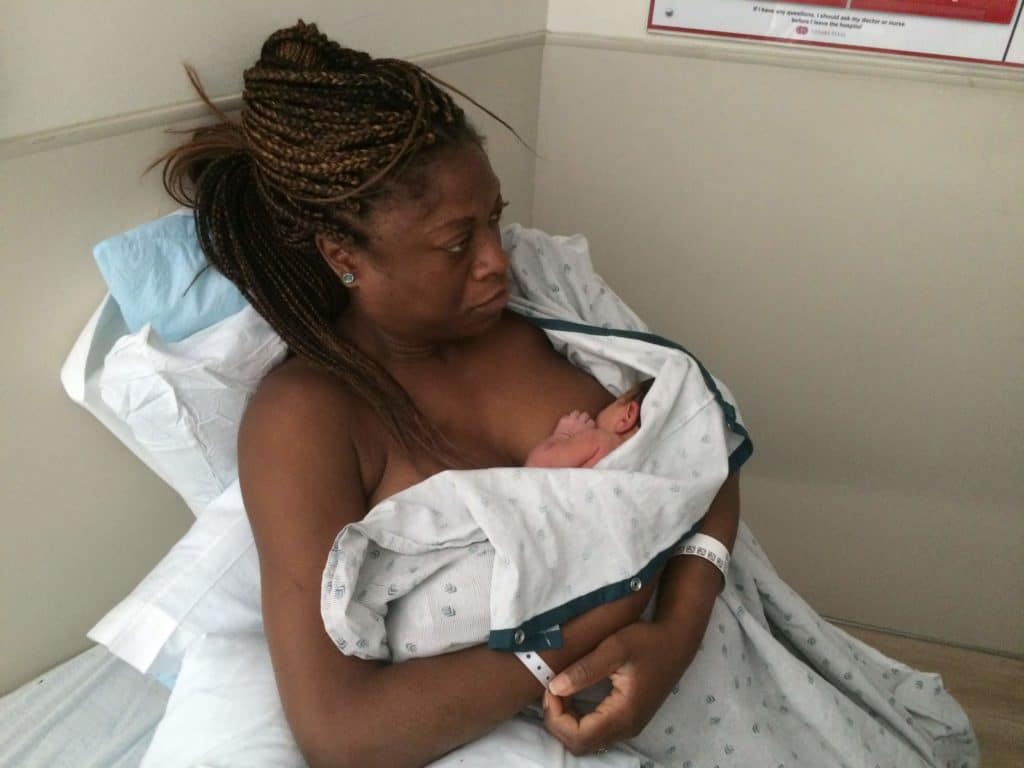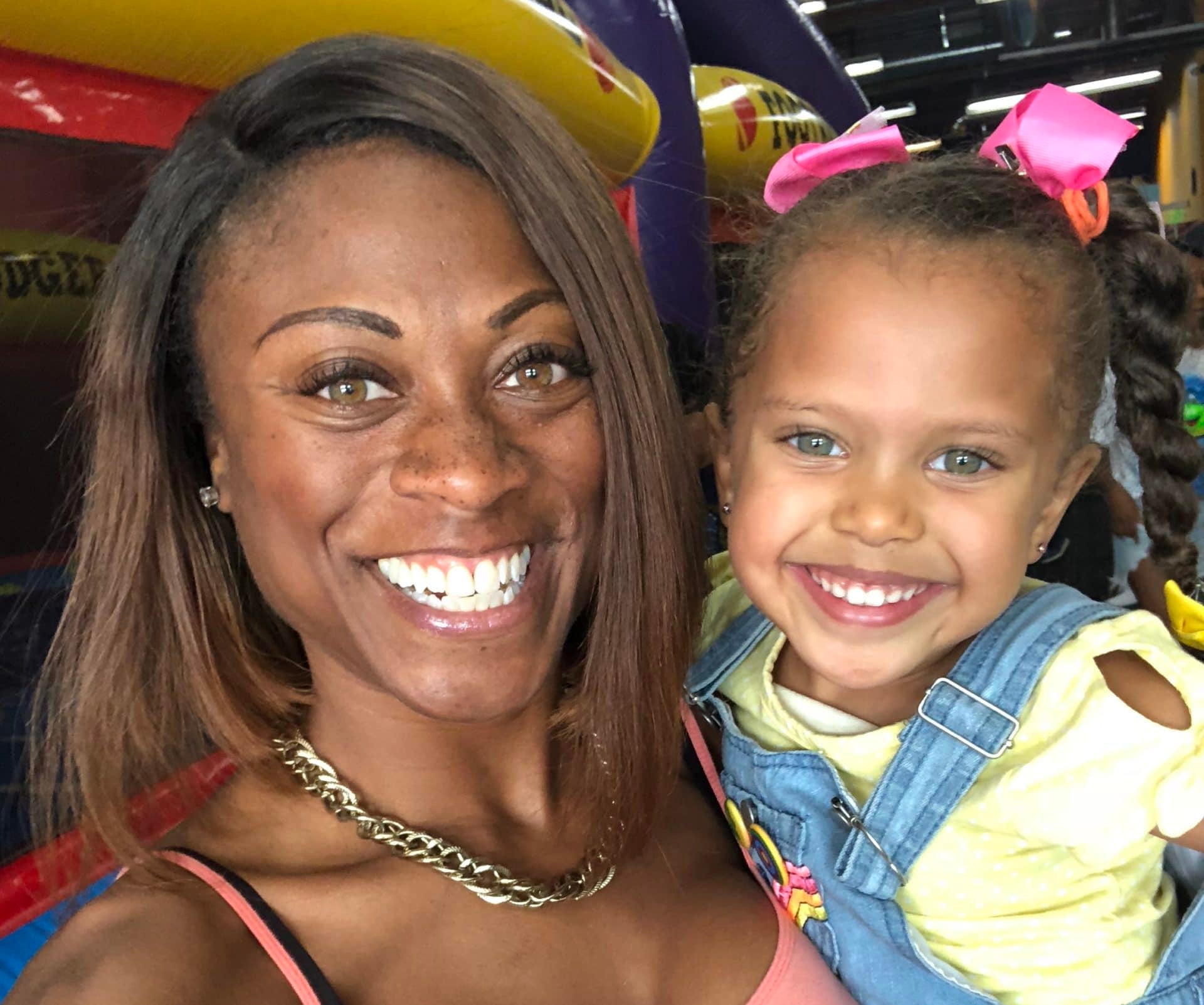When
comedienne Angelina Spicer‘s therapist informed her that she had postpartum depression and she needed to check herself into a psychiatric hospital in February 2016 when her daughter was about 8 months old, she wasn’t scared or even concerned. In fact, she tells ESSENCE
she just wanted to know if she’d be able to get some rest.
“This is how sick I was. My first thought was ‘Can I sleep there? Like, can I just rest?'” Spicer acknowledged with a wry chuckle. “It was more like I wanted a release from eating dinner in my car just to have some alone time. Or just running away to the 99 Cent Store, just to peruse around so I could be without my daughter for a moment.”
Spicer spent 10 days in the hospital getting the help she needed, something she calls a “beautiful experience.” But although she walked out feeling much better, she then dealt with perhaps what many moms who suffer from postpartum depression feel: shame, embarrassment, guilt.
It took Spicer a while to find the humor in her experience, even as someone who specializes in making people laugh. But now she’s ready to share that experience on a bigger platform hoping to help women draw back that same veil of shame and guilt that often comes with maternal mental health struggles.
Spicer is working on a documentary that details her experience with the illness to start the conversation because the more people talk about postpartum depression and other ailments from which postpartum moms suffer, the less stigma there is attached.
A little over a year ago she launched a
GoFundMe campaign to help fund the ambitious documentary.
“Without continued financial support from people I won’t be able to continue making the film. Right now, just with social media, we’ve raised $16,000 and I’ve partnered up with Emmy award-winning director Sarah Moshman. Sarah is a documentary filmmaker, bad–s, and she’s a new mom,” Spicer said. “We’re hoping at this point that we can partner up with a larger producer. On the top of our list is Ava Duvernay or Chrissy Teigen. They have the materials for the film so far, so we’re just hoping to get their support.”
Spicer, of course, wants to make sure the film gets made so it can be a resource to everyone.
“I feel like Black women, we are taught to just muscle through it and that is ultimately what led me to the hospital. I felt like if I just kept going, it would get easier,” Spicer added. “Everybody kept saying, ‘Once she’s three months old, it’ll be fine,’ ‘Once she starts sleeping through the night, it’ll be fine. Once she starts crawling.’ And I’m like, ‘Y’all, all these milestones have passed and I’m still struggling.'”
Spicer felt that if she spoke up, especially as a Black woman, it would give other Black women room to do what many of them probably should do: stop, cry and ask for help.
There is also the importance of recognizing the symptoms. Of course, just like any other illness, postpartum depression takes on many faces. According to the
Mayo Clinic, symptoms can include mood swings, anxiety, sadness, irritability, feeling overwhelmed, crying and appetite problems. Spicer recalls feeling “severely unmotivated” even though she still did her comedy shows at night, still pumped breast milk backstage and still tried to be a mother to her daughter.
“It was like extreme sadness, loneliness. I was distant with my baby. I felt like I should love her more than I felt like I wanted to be around her. And I just felt like every time I was around her I was hypervigilant,” she explained describing her symptoms. “Like was she okay? Is she breathing? Is the room too warm? Is she going to wake up in ten minutes? Do I lay here for five minutes and then get up and pump before I go nurse her? Do I nurse her while she sleeps?”

So what’s so funny about postpartum depression? Well the fact that everybody lies, Spicer quipped.
“I feel like everyone lies. That’s the humor and that’s sort of my entry point,” she said. “I feel like everyone lied about the broken vagina. They lied about breast milk shooting across the room. They lie about how excited they are that you’re having a baby, but they’re nowhere to be found when you actually need boots on the ground help.”
They also lie about psychiatric hospitals, which often have a bad reputation.
“People say that psychiatric hospitals are spooky and filled with homeless people, that they’re going to dope you up with medication and put you in a straight jacket in a white room. No, girl, this is like college but with room service,” she joked. “It literally felt like the Waldorf Hysteria. They cooked for me, they cleaned for me, I had group therapy sessions, they checked on me every fifteen minutes. I did not know that that was suicide watch, but I felt important.”
And perhaps more importantly people lie online.
“People only share the portrait mode of the iPhone picture. Everything’s glossy and beautiful and the baby’s coo-ing and awe-ing and all of this sh-t, and I’m like, ‘Where’s the mother with the engorged boobs?’ You know? ‘Where is that mother spraying milk on the walls?'”
Diagnosis is especially important to Spicer, who endured for eight months before she was helped by her therapist. Not her doctor, mind you, or even her OBGYN, but the therapist she had been seeing throughout the years. Had Spicer not been going to therapy, had she not been introduced to therapy all those years ago through her husband, the story could have been different.
Not only is Spicer fighting for her documentary, but she is also fighting for all moms on the legislative level. Spicer’s step into this form of activism began when she started working as a national spokesperson for the
Blue Dot Project, a nonprofit organization that deals with maternal mental health.

From there, she’s secured other speaking engagements and ended up lobbying in Sacramento, California and Capitol Hill. Spicer spoke to California’s Democratic Senators Dianne Feinstein and Kamala Harris about maternal health and her own story, and also introduced three bills that ended up being approved by Calif. Gov. Jerry Brown
Starting January 1, 2020
, one bill requires hospitals to provide maternal mental health training to clinical staff who work with pregnant and postpartum women and to educate the women and families on the symptoms of maternal mental health disorders.
Another bill requires obstetric providers to confirm that
a mother has been screened (or screen the mother directly) at least once during pregnancy or postpartum for any maternal mental health problems starting July 1, 2019. The final bill requires that the Department of Public Health
apply for federal funding to support maternal mental health.
“I just feel like postpartum is the new Black. The more people talk about it, the more we will realize that more people have it than not. Or have had it, than not. And that will enable people to get help,” Spicer said.

 So what’s so funny about postpartum depression? Well the fact that everybody lies, Spicer quipped.
“I feel like everyone lies. That’s the humor and that’s sort of my entry point,” she said. “I feel like everyone lied about the broken vagina. They lied about breast milk shooting across the room. They lie about how excited they are that you’re having a baby, but they’re nowhere to be found when you actually need boots on the ground help.”
They also lie about psychiatric hospitals, which often have a bad reputation.
“People say that psychiatric hospitals are spooky and filled with homeless people, that they’re going to dope you up with medication and put you in a straight jacket in a white room. No, girl, this is like college but with room service,” she joked. “It literally felt like the Waldorf Hysteria. They cooked for me, they cleaned for me, I had group therapy sessions, they checked on me every fifteen minutes. I did not know that that was suicide watch, but I felt important.”
And perhaps more importantly people lie online.
“People only share the portrait mode of the iPhone picture. Everything’s glossy and beautiful and the baby’s coo-ing and awe-ing and all of this sh-t, and I’m like, ‘Where’s the mother with the engorged boobs?’ You know? ‘Where is that mother spraying milk on the walls?'”
Diagnosis is especially important to Spicer, who endured for eight months before she was helped by her therapist. Not her doctor, mind you, or even her OBGYN, but the therapist she had been seeing throughout the years. Had Spicer not been going to therapy, had she not been introduced to therapy all those years ago through her husband, the story could have been different.
Not only is Spicer fighting for her documentary, but she is also fighting for all moms on the legislative level. Spicer’s step into this form of activism began when she started working as a national spokesperson for the Blue Dot Project, a nonprofit organization that deals with maternal mental health.
So what’s so funny about postpartum depression? Well the fact that everybody lies, Spicer quipped.
“I feel like everyone lies. That’s the humor and that’s sort of my entry point,” she said. “I feel like everyone lied about the broken vagina. They lied about breast milk shooting across the room. They lie about how excited they are that you’re having a baby, but they’re nowhere to be found when you actually need boots on the ground help.”
They also lie about psychiatric hospitals, which often have a bad reputation.
“People say that psychiatric hospitals are spooky and filled with homeless people, that they’re going to dope you up with medication and put you in a straight jacket in a white room. No, girl, this is like college but with room service,” she joked. “It literally felt like the Waldorf Hysteria. They cooked for me, they cleaned for me, I had group therapy sessions, they checked on me every fifteen minutes. I did not know that that was suicide watch, but I felt important.”
And perhaps more importantly people lie online.
“People only share the portrait mode of the iPhone picture. Everything’s glossy and beautiful and the baby’s coo-ing and awe-ing and all of this sh-t, and I’m like, ‘Where’s the mother with the engorged boobs?’ You know? ‘Where is that mother spraying milk on the walls?'”
Diagnosis is especially important to Spicer, who endured for eight months before she was helped by her therapist. Not her doctor, mind you, or even her OBGYN, but the therapist she had been seeing throughout the years. Had Spicer not been going to therapy, had she not been introduced to therapy all those years ago through her husband, the story could have been different.
Not only is Spicer fighting for her documentary, but she is also fighting for all moms on the legislative level. Spicer’s step into this form of activism began when she started working as a national spokesperson for the Blue Dot Project, a nonprofit organization that deals with maternal mental health.
 From there, she’s secured other speaking engagements and ended up lobbying in Sacramento, California and Capitol Hill. Spicer spoke to California’s Democratic Senators Dianne Feinstein and Kamala Harris about maternal health and her own story, and also introduced three bills that ended up being approved by Calif. Gov. Jerry Brown
Starting January 1, 2020, one bill requires hospitals to provide maternal mental health training to clinical staff who work with pregnant and postpartum women and to educate the women and families on the symptoms of maternal mental health disorders.
Another bill requires obstetric providers to confirm that a mother has been screened (or screen the mother directly) at least once during pregnancy or postpartum for any maternal mental health problems starting July 1, 2019. The final bill requires that the Department of Public Health apply for federal funding to support maternal mental health.
“I just feel like postpartum is the new Black. The more people talk about it, the more we will realize that more people have it than not. Or have had it, than not. And that will enable people to get help,” Spicer said.
From there, she’s secured other speaking engagements and ended up lobbying in Sacramento, California and Capitol Hill. Spicer spoke to California’s Democratic Senators Dianne Feinstein and Kamala Harris about maternal health and her own story, and also introduced three bills that ended up being approved by Calif. Gov. Jerry Brown
Starting January 1, 2020, one bill requires hospitals to provide maternal mental health training to clinical staff who work with pregnant and postpartum women and to educate the women and families on the symptoms of maternal mental health disorders.
Another bill requires obstetric providers to confirm that a mother has been screened (or screen the mother directly) at least once during pregnancy or postpartum for any maternal mental health problems starting July 1, 2019. The final bill requires that the Department of Public Health apply for federal funding to support maternal mental health.
“I just feel like postpartum is the new Black. The more people talk about it, the more we will realize that more people have it than not. Or have had it, than not. And that will enable people to get help,” Spicer said.




